Burt A. The Evolution of the British Empire and Commonwealth From the American Revolution
Подождите немного. Документ загружается.

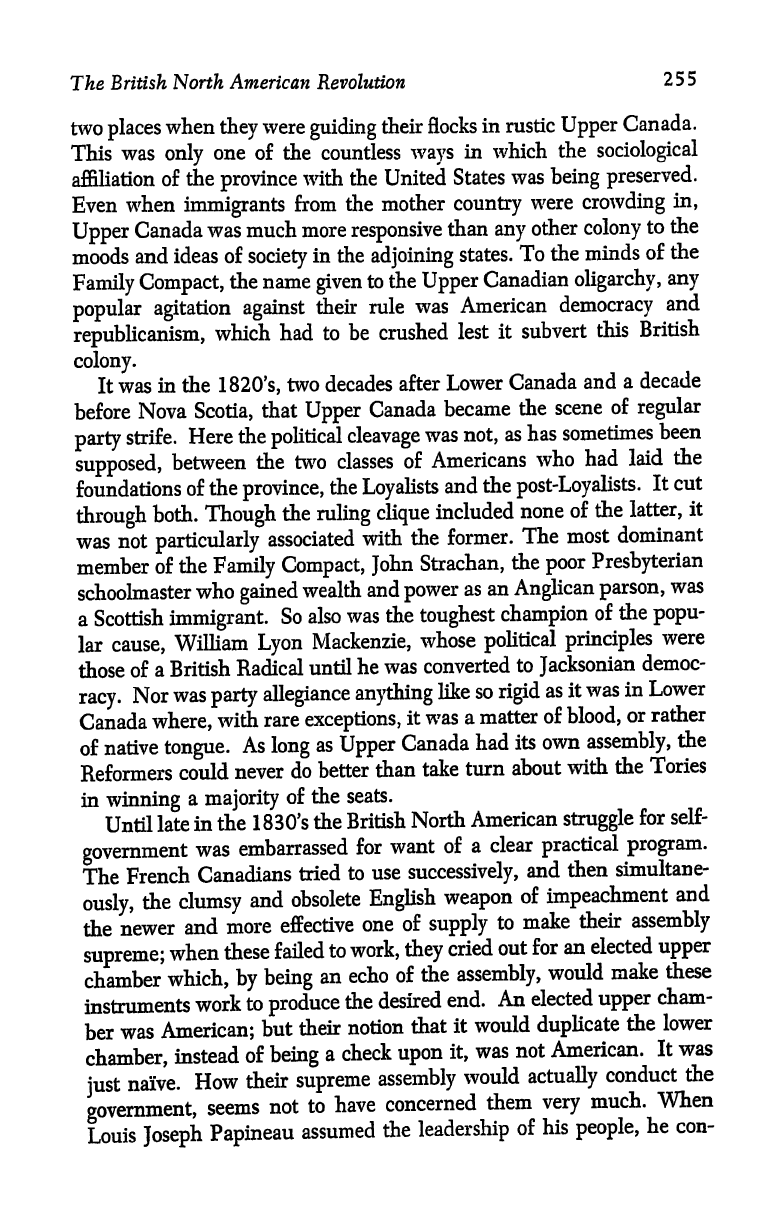
The
British
North
American
Revolution
255
two
places
when
they
were
guiding
their
flocks
in
rustic
Upper
Canada.
This
was
only
one
of the countless
ways
in
which
the
sociological
affiliation
of
the
province
with
the United
States
was
being
preserved.
Even
when
immigrants
from
the mother
country
were
crowding
in,
Upper
Canada
was much more
responsive
than
any
other
colony
to
the
moods
and ideas
of
society
in the
adjoining
states.
To
the
minds
of
the
Family
Compact,
the name
given
to
the
Upper
Canadian
oligarchy,
any
popular
agitation
against
their
rule
was
American
democracy
and
republicanism,
which had
to
be
crushed
lest
it subvert
this
British
colony.
It
was
in the
1820's,
two
decades
after
Lower
Canada
and
a decade
before
Nova
Scotia,
that
Upper
Canada
became
the
scene
of
regular
party
strife.
Here
the
political
cleavage
was
not,
as has
sometimes
been
supposed,
between
the two classes
of
Americans
who
had
laid
the
foundations
of
the
province,
the
Loyalists
and
the
post-Loyalists.
It
cut
through
both.
Though
the
ruling
clique
included
none
of
the
latter,
it
was
not
particularly
associated
with
the
former.
The
most
dominant
member
of
the
Family
Compact,
John
Strachan,
the
poor
Presbyterian
schoolmaster
who
gained
wealth
and
power
as
an
Anglican
parson,
was
a
Scottish
immigrant.
So
also
was
the
toughest
champion
of
the
popu-
lar
cause,
William
Lyon
Mackenzie,
whose
political
principles
were
those
of
a British
Radical
until
he
was
converted
to
Jacksonian
democ-
racy.
Nor
was
party
allegiance
anything
like
so
rigid
as
it
was
in
Lower
Canada
where,
with
rare
exceptions,
it
was
a
matter
of
blood,
or
rather
of
native
tongue.
As
long
as
Upper
Canada
had
its
own
assembly,
the
Reformers
could
never
do
better
than
take
turn
about
with
the
Tories
in
winning
a
majority
of
the seats.
Until
late
in
the
1830's
the
British
North
American
struggle
for
self-
government
was
embarrassed
for
want
of
a
clear
practical
program.
The
French
Canadians
tried
to
use
successively,
and
then
simultane-
ously,
the
clumsy
and
obsolete
English
weapon
of
impeachment
and
the
newer
and
more
effective
one
of
supply
to
make
their
assembly
supreme;
when
these
failed
to
work,
they
cried
out
for
an
elected
upper
chamber
which,
by
being
an
echo
of
the
assembly,
would
make
these
instruments
work
to
produce
the
desired
end.
An
elected
upper
cham-
ber
was
American;
but
their
notion
that
it
would
duplicate
the
lower
chamber,
instead
of
being
a
check
upon
it,
was
not
American.
It
was
just
naive.
How
their
supreme
assembly
would
actually
conduct
the
government,
seems
not
to
have
concerned
them
very
much.
When
Louis
Joseph
Papineau
assumed
the
leadership
of
his
people,
he con-
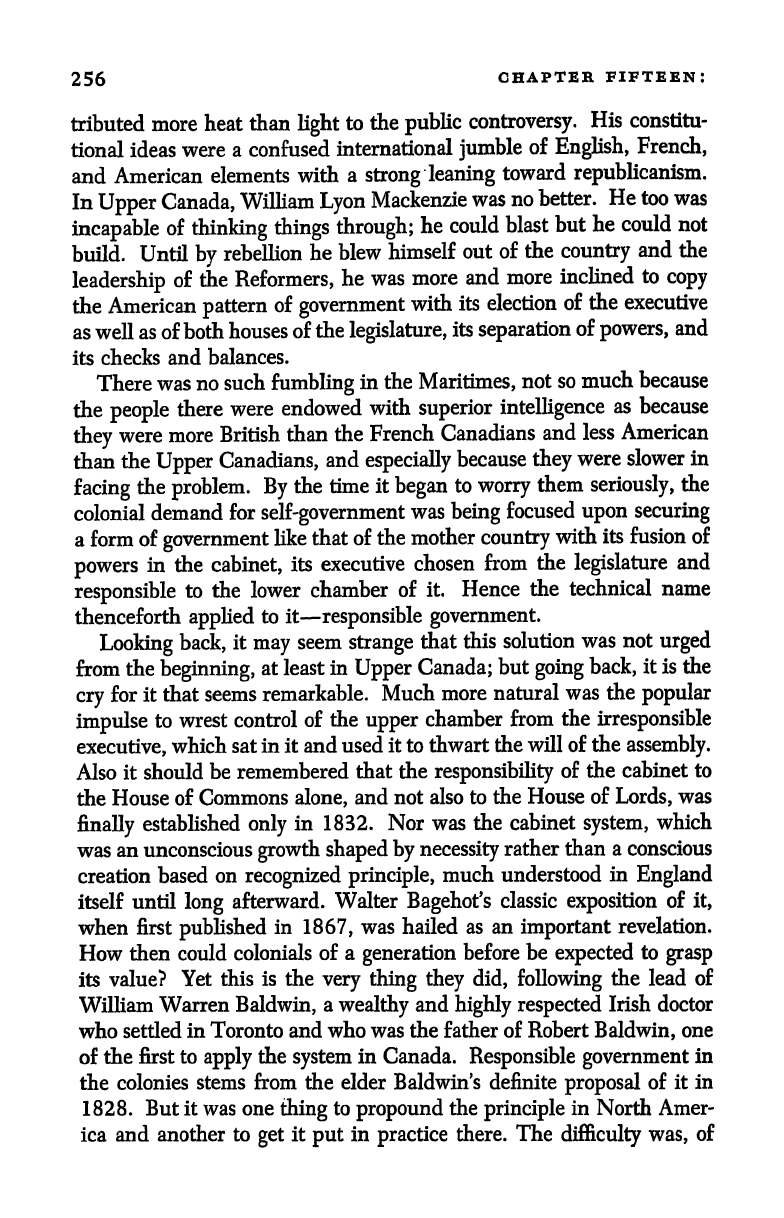
256
CHAPTER
FIFTEEN:
tributed
more
heat
than
light
to
the
public
controversy.
His
constitu-
tional ideas
were
a confused
international
jumble
of
English,
French,
and
American
elements
with
a
strong
leaning
toward
republicanism.
In
Upper
Canada,
William
Lyon
Mackenzie
was
no
better.
He
too was
incapable
of
thinking
things
through;
he
could
blast
but
he
could not
build.
Until
by
rebellion
he
blew
himself
out
of
the
country
and the
leadership
of
the
Reformers,
he
was
more
and
more
inclined
to
copy
the American
pattern
of
government
with
its
election
of
the executive
as well
as of both
houses
of
the
legislature,
its
separation
of
powers,
and
its
checks and
balances.
There
was
no
such
fumbling
in the
Maritimes,
not
so
much because
the
people
there
were
endowed
with
superior
intelligence
as because
they
were
more
British
than
the French Canadians
and
less
American
than
the
Upper
Canadians,
and
especially
because
they
were slower in
facing
the
problem.
By
the time
it
began
to
worry
them
seriously,
the
colonial
demand
for
self-government
was
being
focused
upon
securing
a
form of
government
like
that of
the
mother
country
with
its
fusion of
powers
in the
cabinet,
its
executive
chosen
from
the
legislature
and
responsible
to
the
lower
chamber
of
it.
Hence
the
technical
name
thenceforth
applied
to
it
responsible
government.
Looking
back,
it
may
seem
strange
that this
solution
was
not
urged
from
the
beginning,
at least
in
Upper
Canada;
but
going
back,
it is the
cry
for
it
that seems
remarkable.
Much
more
natural
was
the
popular
impulse
to
wrest control
of
the
upper
chamber from
the
irresponsible
executive,
which
sat
in it and
used
it
to
thwart
the will of
the
assembly.
Also
it should
be remembered
that
the
responsibility
of
the cabinet to
the
House of Commons
alone,
and not
also to
the House
of
Lords,
was
finally
established
only
in 1832.
Nor was
the
cabinet
system,
which
was
an unconscious
growth
shaped
by
necessity
rather than a conscious
creation
based
on
recognized
principle,
much understood
in
England
itself
until
long
afterward.
Walter
Bagehot's
classic
exposition
of
it,
when
first
published
in
1867,
was hailed as an
important
revelation.
How
then
could colonials
of
a
generation
before be
expected
to
grasp
its
value?
Yet
this
is the
very
thing
they
did,
following
the
lead
of
William
Warren
Baldwin,
a
wealthy
and
highly
respected
Irish
doctor
who
settled
in Toronto and who was the father of Robert
Baldwin,
one
of
the
first to
apply
the
system
in Canada.
Responsible
government
in
the
colonies
stems from
the
elder Baldwin's definite
proposal
of
it
in
1828.
But
it was one
thing
to
propound
the
principle
in
North
Amer-
ica and
another
to
get
it
put
in
practice
there. The
difficulty
was,
of
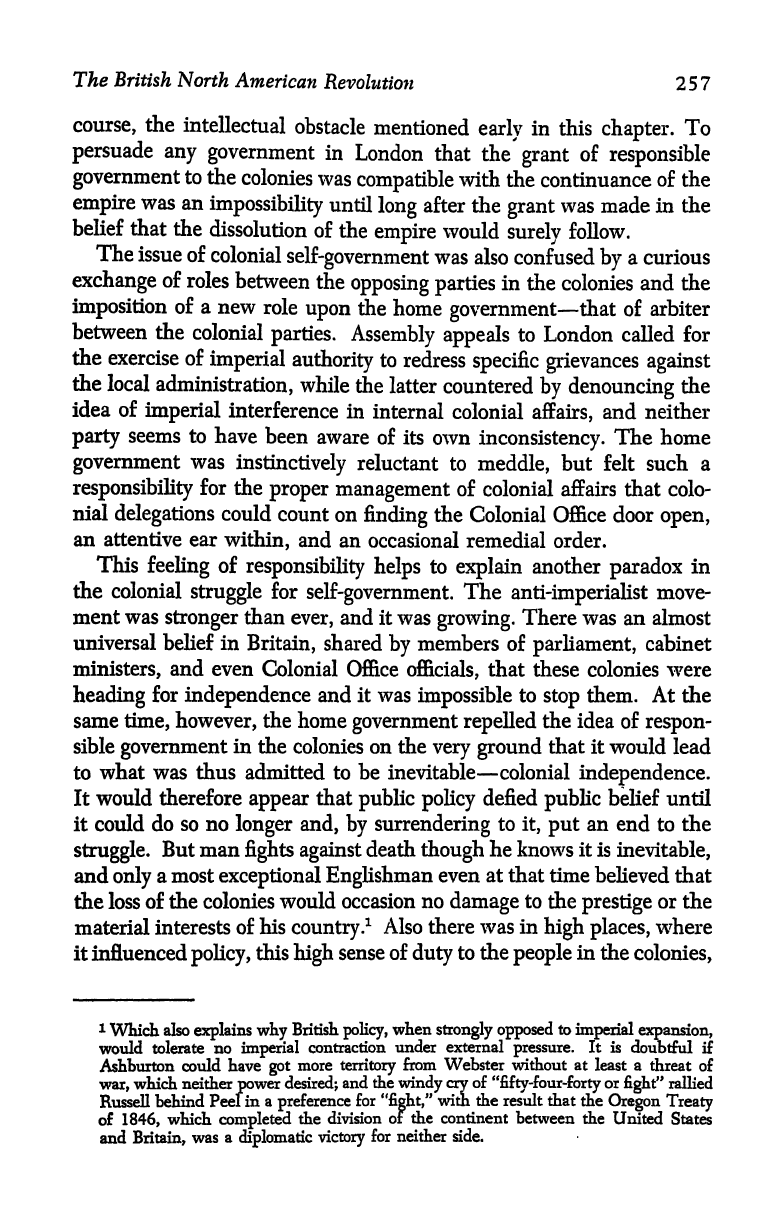
The
British
North
American
Revolution
257
course,
the
intellectual
obstacle
mentioned
early
in this
chapter.
To
persuade
any
government
in
London
that
the
grant
of
responsible
government
to
the
colonies
was
compatible
with the
continuance
of the
empire
was
an
impossibility
until
long
after
the
grant
was
made
in
the
belief
that the
dissolution
of
the
empire
would
surely
follow.
The
issue
of
colonial
self-government
was
also confused
by
a
curious
exchange
of
roles
between
the
opposing
parties
in
the
colonies
and the
imposition
of
a
new
role
upon
die home
government
that
of
arbiter
between
the
colonial
parties.
Assembly
appeals
to
London
called for
the exercise
of
imperial
authority
to
redress
specific grievances against
the
local
administration,
while
the
latter
countered
by denouncing
the
idea
of
imperial
interference
in
internal
colonial
affairs,
and
neither
party
seems
to
have
been
aware
of its
own
inconsistency.
The
home
government
was
instinctively
reluctant
to
meddle,
but felt such a
responsibility
for the
proper
management
of
colonial
affairs
that colo-
nial
delegations
could
count
on
finding
the
Colonial Office door
open,
an attentive
ear
within,
and
an
occasional remedial
order.
This
feeling
of
responsibility helps
to
explain
another
paradox
in
the
colonial
struggle
for
self-government.
The
anti-imperialist
move-
ment
was
stronger
than
ever,
and it
was
growing.
There was
an
almost
universal
belief
in
Britain,
shared
by
members of
parliament,
cabinet
ministers,
and
even
Colonial
Office
officials,
that
these colonies
were
heading
for
independence
and
it
was
impossible
to
stop
them. At the
same
time, however,
the
home
government repelled
the
idea
of
respon-
sible
government
in
the
colonies
on the
very
ground
that
it
would lead
to
what was thus
admitted
to be inevitable colonial
independence.
It would
therefore
appear
that
public
policy
defied
public
belief until
it could do so
no
longer
and,
by
surrendering
to
it,
put
an
end to
the
struggle.
But man
fights
against
death
though
he
knows
it
is
inevitable,
and
only
a most
exceptional
Englishman
even at that time
believed
that
the loss
of the colonies would
occasion
no
damage
to
the
prestige
or the
material
interests
of
his
country.
1
Also
there was in
high
places,
where
it influenced
policy,
this
high
sense
of
duty
to the
people
in
the
colonies,
1
Which
also
explains
why
British
policy,
when
strongly
opposed
to
imperial
expansion,
would
tolerate
no
imperial
contraction
under external
pressure.
It
is
doubtful
if
Ashburton
could
have
got
more
territory
from Webster without
at
least
a
threat
of
war,
which
neither
power
desired;
and
the
windy
cry
of
"fifty-four-forty
or
fight"
rallied
Russell
behind
Peel
in
a
preference
for
"fight,"
with
the
result that
the
Oregon
Treaty
of
1846,
which
completed
the
division
of
the
continent
between
the
United
States
and
Britain,
was
a
diplomatic
victory
for neither
side.
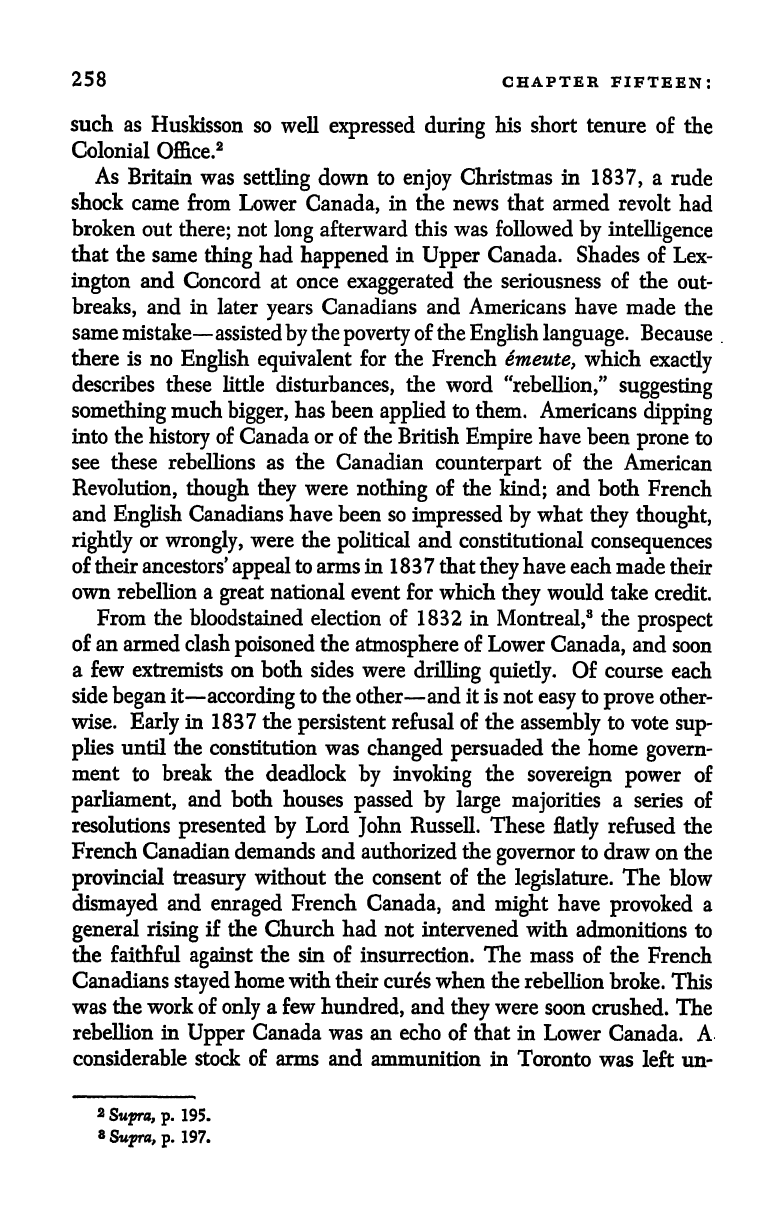
258
CHAPTER
FIFTEEN:
such
as
Huskisson so
well
expressed during
his short
tenure
of
the
Colonial
Office.
2
As
Britain
was
settling
down
to
enjoy
Christmas in
1837,
a
rude
shock
came
from
Lower
Canada,
in the news that armed
revolt
had
broken
out
there;
not
long
afterward
this
was followed
by
intelligence
that
the
same
thing
had
happened
in
Upper
Canada. Shades
of
Lex-
ington
and
Concord
at once
exaggerated
the
seriousness of
the
out-
breaks,
and in later
years
Canadians and Americans have
made
the
same
mistake
assisted
by
the
poverty
of
the
English
language.
Because
there is
no
English equivalent
for
die
French
emeute,
which
exactly
describes these
little
disturbances,
the word
"rebellion,"
suggesting
something
much
bigger,
has
been
applied
to
them.
Americans
dipping
into
the
history
of Canada
or
of
the
British
Empire
have
been
prone
to
see
these rebellions
as
the
Canadian
counterpart
of
the
American
Revolution,
though
they
were
nothing
of
the
kind;
and both
French
and
English
Canadians
have
been so
impressed
by
what
they
thought,
rightly
or
wrongly,
were the
political
and constitutional
consequences
of
their
ancestors
1
appeal
to arms
in 1
83
7
that
they
have each
made
their
own
rebellion a
great
national event for which
they
would take
credit.
From the
bloodstained election of 1832 in
Montreal,
3
the
prospect
of
an
armed clash
poisoned
the
atmosphere
of Lower
Canada,
and
soon
a few extremists
on
both
sides
were
drilling
quietly.
Of course
each
side
began
it
according
to the other
and
it is
not
easy
to
prove
other-
wise.
Early
in
1837
the
persistent
refusal of the
assembly
to
vote
sup-
plies
until the
constitution was
changed persuaded
the
home
govern-
ment
to
break the
deadlock
by
invoking
the
sovereign power
of
parliament,
and
both
houses
passed
by
large
majorities
a
series
of
resolutions
presented
by
Lord
John
Russell. These
flatly
refused
the
French
Canadian demands and authorized the
governor
to draw
on the
provincial
treasury
without
the
consent of the
legislature.
The
blow
dismayed
and
enraged
French
Canada,
and
might
have
provoked
a
general rising
if
the
Church
had
not
intervened with
admonitions
to
the faithful
against
the
sin
of insurrection. The
mass
of the
French
Canadians
stayed
home with their cur6s
when
the
rebellion
broke. This
was the work of
only
a
few
hundred,
and
they
were
soon
crushed.
The
rebellion
in
Upper
Canada
was
an echo
of
that in
Lower
Canada. A
considerable stock of arms
and ammunition
in
Toronto
was
left
un-
2
Supra,
p.
195.
8
Supra,
p.
197.
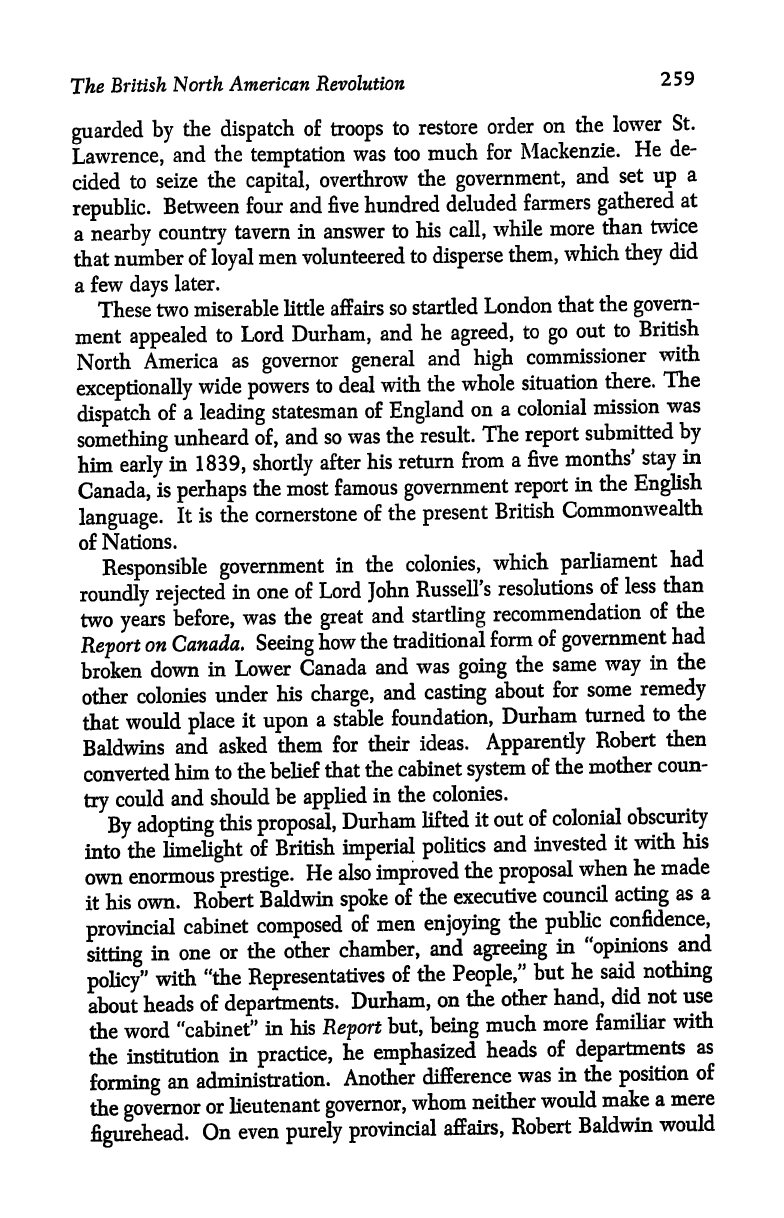
The
British
North
American
Revolution
259
guarded
by
the
dispatch
of
troops
to
restore
order
on
the
lower
St.
Lawrence,
and
the
temptation
was
too
much
for
Mackenzie.
He
de-
cided
to
seize
the
capital,
overthrow
the
government,
and
set
up
a
republic.
Between
four
and
five
hundred
deluded
farmers
gathered
at
a
nearby
country
tavern
in
answer
to
his
call,
while
more
than
twice
that
number
of
loyal
men volunteered
to
disperse
them,
which
they
did
a
few
days
later.
These
two
miserable
little
affairs
so
startled
London
that
the
govern-
ment
appealed
to
Lord
Durham,
and
he
agreed,
to
go
out
to
British
North
America
as
governor
general
and
high
commissioner
with
exceptionally
wide
powers
to deal
with
the
whole
situation
there.
The
dispatch
of
a
leading
statesman
of
England
on
a
colonial
mission
was
something
unheard
of,
and
so
was
the
result.
The
report
submitted
by
him
early
in
1839,
shortly
after
his
return
from
a
five
months
1
stay
in
Canada,
is
perhaps
the
most
famous
government
report
in
the
English
language.
It
is
the
cornerstone
of
the
present
British
Commonwealth
of
Nations.
Responsible
government
in
the
colonies,
which
parliament
had
roundly
rejected
in one
of
Lord
John
Russell's
resolutions
of
less
than
two
years
before,
was the
great
and
startling
recommendation
of
the
Report
on Canada.
Seeing
how
the
traditional
form
of
government
had
broken
down
in
Lower
Canada
and
was
going
the
same
way
in
the
other
colonies
under
his
charge,
and
casting
about
for
some
remedy
that
would
place
it
upon
a stable
foundation,
Durham
turned
to
the
Baldwins
and
asked
them
for
their
ideas.
Apparently
Robert
then
converted
him
to
the
belief
that
the
cabinet
system
of
the
mother
coun-
try
could
and
should
be
applied
in
the
colonies.
By
adopting
this
proposal,
Durham
lifted
it out
of
colonial
obscurity
into
the
limelight
of
British
imperial
politics
and
invested
it
with
his
own
enormous
prestige.
He
also
improved
the
proposal
when
he
made
it
his
own.
Robert
Baldwin
spoke
of
the
executive
council
acting
as
a
provincial
cabinet
composed
of
men
enjoying
the
public
confidence,
sitting
in
one
or
the
other
chamber,
and
agreeing
in
"opinions
and
policy"
with
"the
Representatives
of
the
People,"
but
he
said
nothing
about
heads
of
departments.
Durham,
on
the
other
hand,
did
not
use
the
word
"cabinet"
in
his
Report
but,
being
much
more
familiar
with
the
institution
in
practice,
he
emphasized
heads
of
departments
as
forming
an
administration.
Another
difference
was
in
the
position
of
the
governor
or lieutenant
governor,
whom
neither
would
make
a
mere
figurehead.
On
even
purely
provincial
affairs,
Robert
Baldwin
would
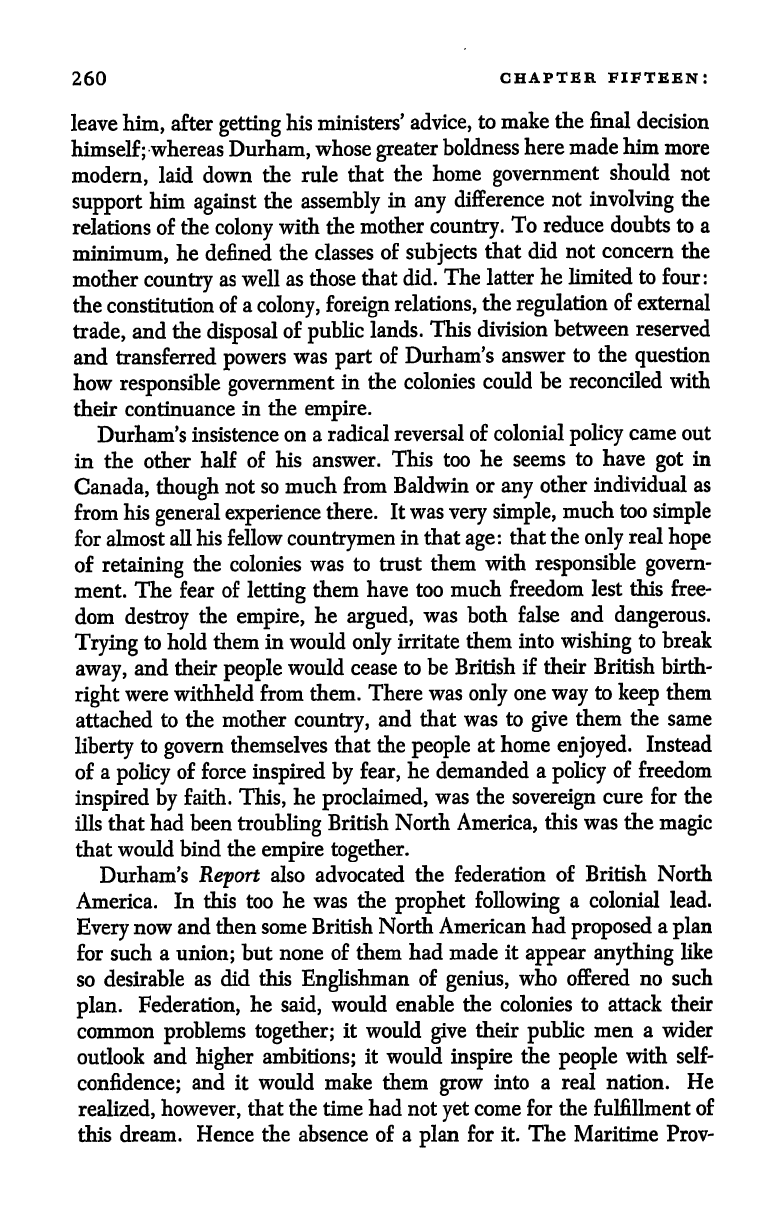
260
CHAPTER
FIFTEEN:
leave
him,
after
getting
his
ministers'
advice,
to
make
the final
decision
himself
;
whereas
Durham,
whose
greater
boldness
here
made him
more
modern,
laid down
the rule
that
the
home
government
should
not
support
him
against
the
assembly
in
any
difference
not
involving
the
relations of
the
colony
with
the
mother
country.
To
reduce doubts
to a
minimum,
he defined
the classes
of
subjects
that did
not concern the
mother
country
as well
as
those
that
did.
The latter
he limited
to
four:
the
constitution
of
a
colony,
foreign
relations,
the
regulation
of
external
trade,
and the
disposal
of
public
lands.
This division
between reserved
and transferred
powers
was
part
of
Durham's
answer
to the
question
how
responsible government
in the
colonies
could
be
reconciled
with
their continuance
in
the
empire.
Durham's
insistence
on
a radical
reversal
of colonial
policy
came out
in
the other
half
of
his
answer.
This too
he seems
to
have
got
in
Canada,
though
not so
much from
Baldwin
or
any
other
individual as
from
his
general
experience
there. It
was
very
simple,
much
too
simple
for
almost
all
his
fellow
countrymen
in
that
age:
that
the
only
real
hope
of
retaining
the colonies
was
to
trust
them
with
responsible govern-
ment.
The fear
of
letting
them
have
too much
freedom
lest this free-
dom
destroy
the
empire,
he
argued,
was both
false
and
dangerous.
Trying
to hold
them in would
only
irritate
them
into
wishing
to break
away,
and
their
people
would cease
to
be British
if
their
British birth-
right
were
withheld
from them.
There
was
only
one
way
to
keep
them
attached
to the
mother
country,
and
that
was to
give
them the same
liberty
to
govern
themselves
that
the
people
at home
enjoyed.
Instead
of
a
policy
of force
inspired by
fear,
he
demanded
a
policy
of
freedom
inspired
by
faith.
This,
he
proclaimed,
was the
sovereign
cure for the
ills
that
had been
troubling
British North
America,
this
was
the
magic
that
would bind
the
empire together.
Durham's
Report
also advocated
the federation
of British North
America.
In
this
too
he was
the
prophet
following
a colonial lead.
Every
now
and
then some British North
American
had
proposed
a
plan
for
such
a
union;
but
none
of them
had made it
appear anything
like
so
desirable
as did
this
Englishman
of
genius,
who offered no
such
plan.
Federation,
he
said,
would
enable
the colonies to
attack their
common
problems
together;
it
would
give
their
public
men
a wider
outlook
and
higher
ambitions;
it
would
inspire
the
people
with self-
confidence;
and
it
would
make
them
grow
into
a
real
nation.
He
realized,
however,
that the time had not
yet
come for
the fulfillment
of
this dream.
Hence
the absence
of
a
plan
for
it.
The Maritime Prov-
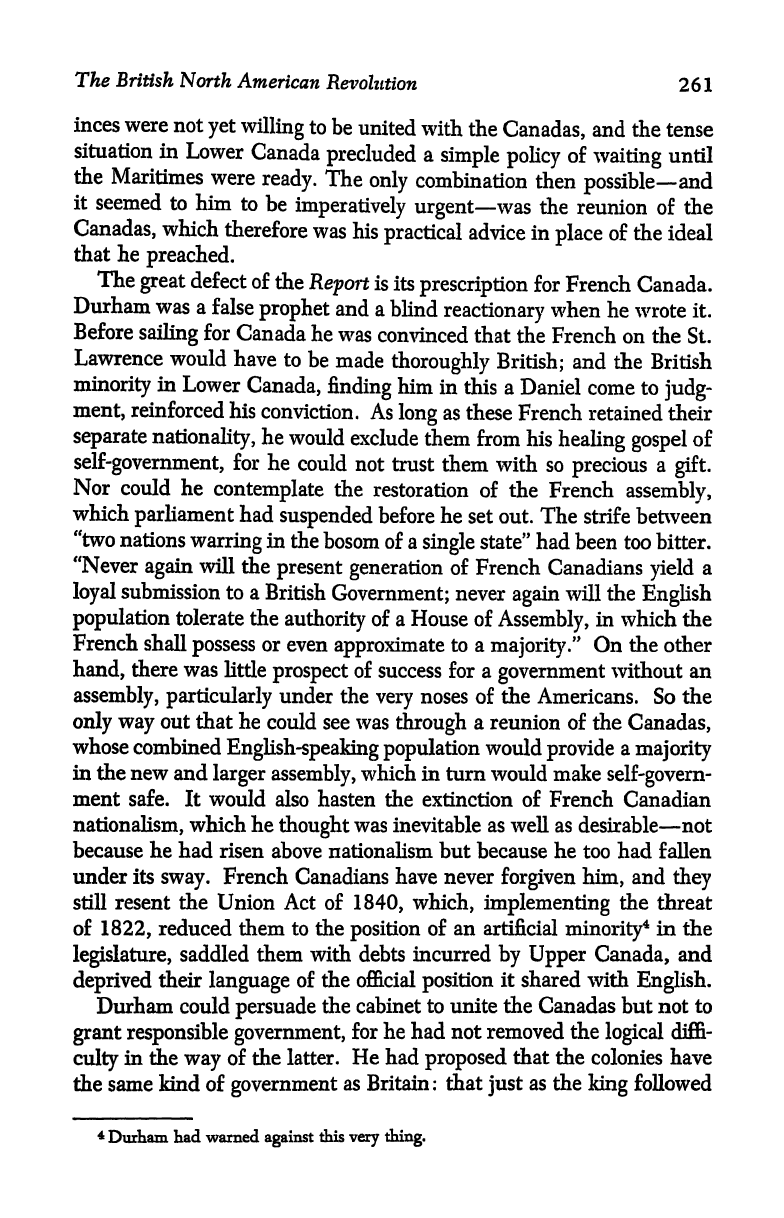
The British
North
American
Revolution
261
inces were
not
yet
willing
to
be
united
with the
Canadas,
and the
tense
situation in
Lower
Canada
precluded
a
simple
policy
of
waiting
until
the
Maritimes
were
ready.
The
only
combination
then
possible
and
it
seemed to him
to
be
imperatively
urgent
was the
reunion
of
the
Canadas,
which
therefore
was
his
practical
advice
in
place
of the ideal
that
he
preached.
The
great
defect
of
the
Report
is
its
prescription
for French
Canada.
Durham
was a
false
prophet
and a
blind
reactionary
when
he wrote it.
Before
sailing
for
Canada
he
was
convinced that
the French
on the
St.
Lawrence
would have
to
be
made
thoroughly
British;
and the British
minority
in
Lower
Canada,
finding
him
in
this a
Daniel come to
judg-
ment,
reinforced
his
conviction.
As
long
as these
French
retained
their
separate
nationality,
he
would
exclude
them
from
his
healing gospel
of
self-government,
for he
could
not trust
them with so
precious
a
gift.
Nor
could he
contemplate
the
restoration of
the French
assembly,
which
parliament
had
suspended
before he
set out. The strife
between
"two
nations
warring
in the
bosom
of a
single
state"
had
been
too
bitter.
"Never
again
will
the
present
generation
of French
Canadians
yield
a
loyal
submission
to a
British
Government;
never
again
will
the
English
population
tolerate the
authority
of a House
of
Assembly,
in
which the
French
shall
possess
or
even
approximate
to a
majority."
On
the
other
hand,
there was
little
prospect
of success for
a
government
without
an
assembly,
particularly
under
the
very
noses of
the
Americans.
So
the
only
way
out
that
he
could
see was
through
a
reunion
of
the
Canadas,
whose
combined
English-speaking population
would
provide
a
majority
in the new
and
larger
assembly,
which in turn
would make
self-govern-
ment safe.
It
would
also hasten
the extinction of French
Canadian
nationalism,
which he
thought
was
inevitable
as
well
as
desirable
not
because
he
had risen
above nationalism
but
because
he
too had fallen
under its
sway.
French
Canadians have never
forgiven
him,
and
they
still
resent
the
Union Act of
1840, which,
implementing
the
threat
of
1822,
reduced
them to the
position
of
an
artificial
minority
4
in the
legislature,
saddled them with debts
incurred
by
Upper
Canada,
and
deprived
their
language
of the official
position
it
shared with
English.
Durham
could
persuade
the cabinet to
unite the
Canadas but
not to
grant
responsible
government,
for he
had
not removed the
logical
diffi-
culty
in the
way
of
the latter.
He
had
proposed
that
the
colonies
have
the
same
kind of
government
as Britain:
that
just
as the
king
followed
4
Durham
had
warned
against
this
very thing.
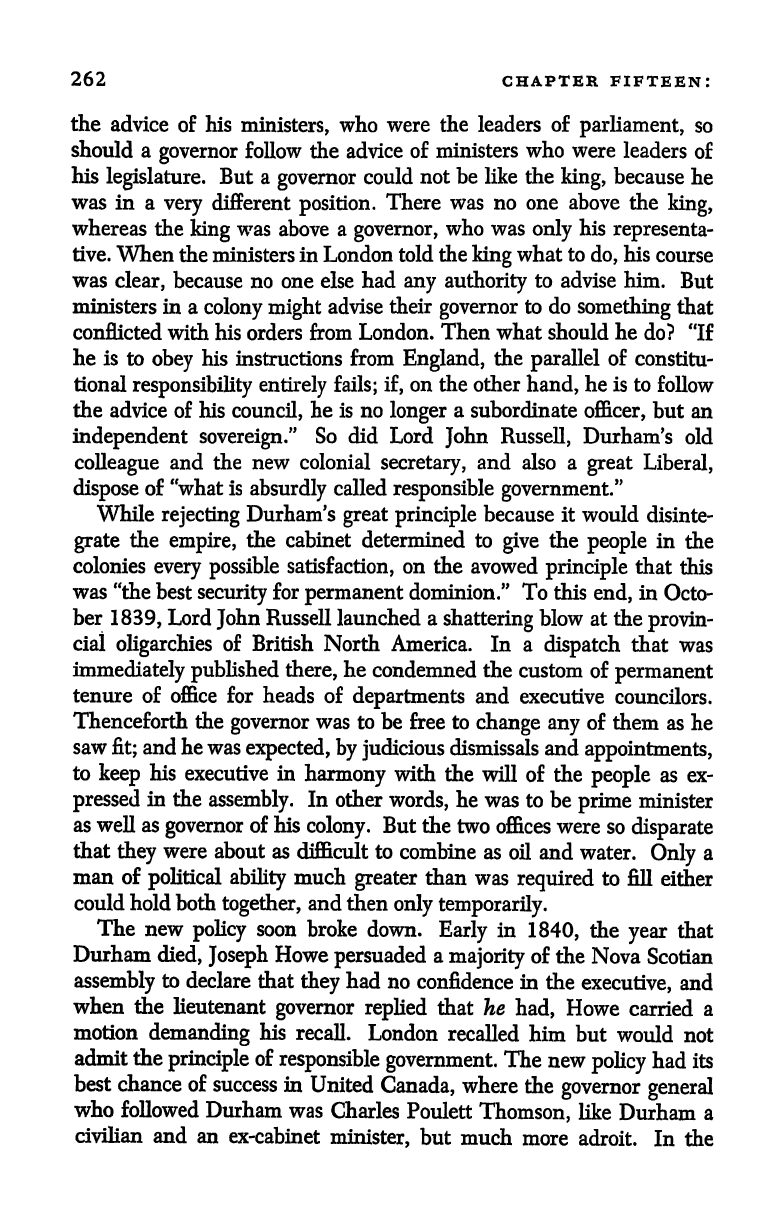
262
CHAPTER
FIFTEEN:
the
advice
of
his
ministers,
who were
the leaders
of
parliament,
so
should
a
governor
follow the
advice
of
ministers
who
were
leaders
of
his
legislature.
But a
governor
could
not
be like
the
king,
because
he
was in a
very
different
position.
There
was no one above the
king,
whereas the
king
was
above
a
governor,
who was
only
his
representa-
tive.
When
the ministers in
London
told
the
king
what to
do,
his
course
was
clear,
because no one else
had
any authority
to advise
him.
But
ministers in a
colony
might
advise
their
governor
to do
something
that
conflicted
with his
orders
from London.
Then what should
he
do?
"If
he
is
to
obey
his instructions from
England,
the
parallel
of
constitu-
tional
responsibility
entirely
fails;
if,
on the other
hand,
he
is
to
follow
the
advice
of his
council,
he
is no
longer
a
subordinate
officer,
but
an
independent sovereign."
So
did
Lord
John
Russell,
Durham's
old
colleague
and the
new
colonial
secretary,
and also a
great
Liberal,
dispose
of
"what is
absurdly
called
responsible
government."
While
rejecting
Durham's
great principle
because it
would
disinte-
grate
the
empire,
the
cabinet determined to
give
the
people
in
the
colonies
every
possible
satisfaction,
on the
avowed
principle
that
this
was "the
best
security
for
permanent
dominion."
To
this
end,
in
Octo-
ber
1839,
Lord
John
Russell
launched
a
shattering
blow at the
provin-
cial
oligarchies
of British
North
America.
In
a
dispatch
that
was
immediately published
there,
he
condemned the
custom
of
permanent
tenure
of office
for heads of
departments
and
executive
councilors.
Thenceforth the
governor
was
to be free to
change any
of
them
as he
saw
fit;
and he was
expected, by judicious
dismissals
and
appointments,
to
keep
his
executive in
harmony
with
the
will
of
the
people
as ex-
pressed
in
the
assembly.
In other
words,
he was
to be
prime
minister
as well as
governor
of his
colony.
But the
two offices
were
so
disparate
that
they
were about as
difficult
to
combine
as
oil and
water.
Only
a
man
of
political
ability
much
greater
than
was
required
to fill
either
could hold both
together,
and then
only
temporarily.
The
new
policy
soon
broke down.
Early
in
1840,
the
year
that
Durham
died,
Joseph
Howe
persuaded
a
majority
of the
Nova
Scotian
assembly
to
declare that
they
had no
confidence in
the
executive,
and
when the
lieutenant
governor
replied
that
he
had,
Howe
carried
a
motion
demanding
his
recall.
London
recalled him but
would not
admit
the
principle
of
responsible
government.
The
new
policy
had
its
best chance of
success
in
United
Canada,
where
the
governor
general
who
followed Durham
was
Charles
Poulett
Thomson,
like
Durham
a
civilian and
an
ex-cabinet
minister,
but much
more
adroit.
In the
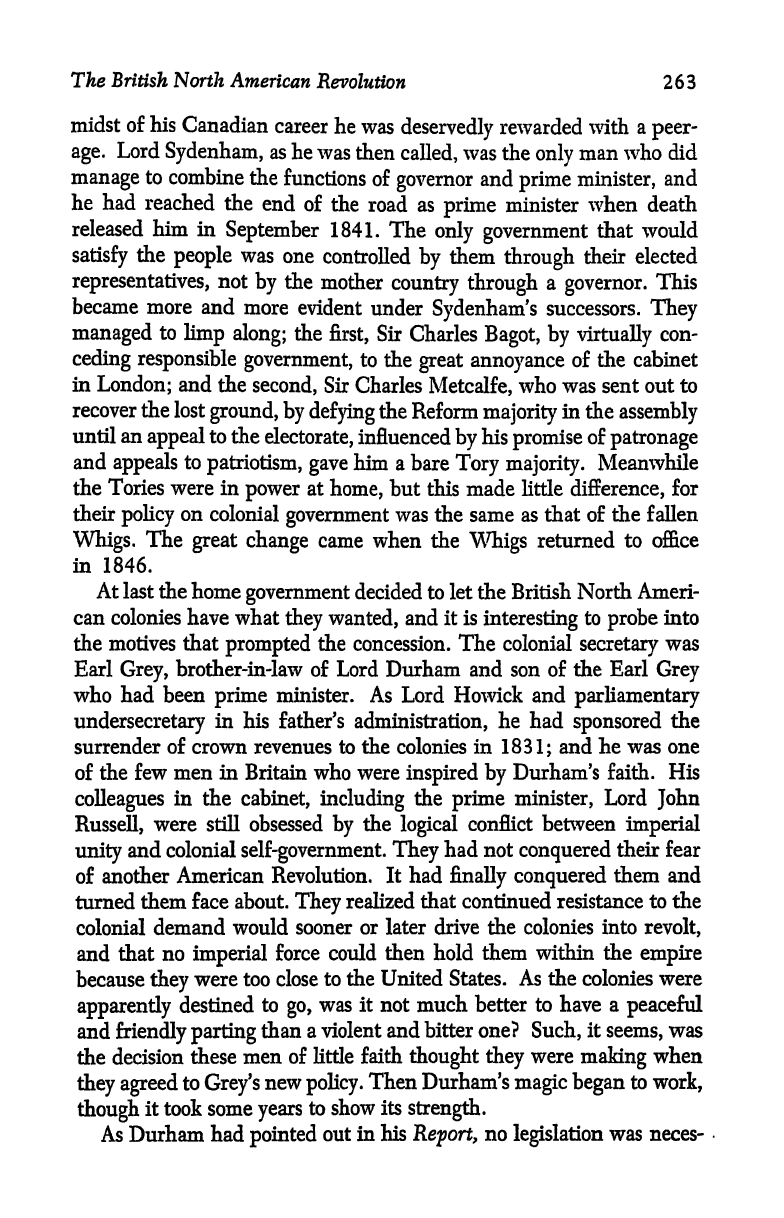
The British North
American
Revolution
263
midst
of his
Canadian
career
he
was
deservedly
rewarded
with
a
peer-
age.
Lord
Sydenham,
as
he
was then
called,
was the
only
man who
did
manage
to
combine
the
functions
of
governor
and
prime
minister,
and
he
had
reached
the
end of
the
road as
prime
minister
when death
released
him
in
September
1841. The
only
government
that would
satisfy
the
people
was
one
controlled
by
them
through
their
elected
representatives,
not
by
the
mother
country
through
a
governor.
This
became more
and more
evident
under
Sydenham's
successors.
They
managed
to
limp
along;
the
first,
Sir
Charles
Bagot,
by virtually
con-
ceding responsible
government,
to the
great
annoyance
of the
cabinet
in
London;
and
the
second,
Sir
Charles
Metcalfe,
who was sent out
to
recover the
lost
ground, by
defying
the
Reform
majority
in
the
assembly
until
an
appeal
to
the
electorate,
influenced
by
his
promise
of
patronage
and
appeals
to
patriotism,
gave
him a
bare
Tory
majority.
Meanwhile
the Tories were in
power
at
home,
but this made
little
difference,
for
their
policy
on
colonial
government
was the same as
that
of
the fallen
Whigs.
The
great
change
came when the
Whigs
returned
to office
in 1846.
At
last the
home
government
decided to let the
British North
Ameri-
can colonies have what
they
wanted,
and
it is
interesting
to
probe
into
the motives
that
prompted
the
concession. The colonial
secretary
was
Earl
Grey,
brother-in-law
of Lord Durham and son of the
Earl
Grey
who had been
prime
minister.
As
Lord
Howick and
parliamentary
undersecretary
in
his father's
administration,
he
had
sponsored
the
surrender
of
crown
revenues to
the
colonies
in
1831;
and
he was one
of
the few
men in
Britain
who
were
inspired by
Durham's faith.
His
colleagues
in the
cabinet,
including
the
prime
minister,
Lord
John
Russell,
were still obsessed
by
the
logical
conflict
between
imperial
unity
and
colonial
self-government.
They
had not
conquered
their fear
of
another
American Revolution, It had
finally
conquered
them
and
turned
them face
about.
They
realized
that
continued resistance
to the
colonial
demand
would
sooner
or
later drive the colonies
into
revolt,
and
that
no
imperial
force could
then
hold
them
within the
empire
because
they
were too close
to
the United
States. As
the
colonies
were
apparently
destined
to
go,
was
it
not much better
to
have
a
peaceful
and
friendly
parting
than
a violent and
bitter one?
Such,
it
seems,
was
the decision
these
men
of little
faith
thought
they
were
making
when
they agreed
to
Grey's
new
policy.
Then Durham's
magic
began
to
work,
though
it
took some
years
to
show its
strength.
As Durham
had
pointed
out
in his
Report,
no
legislation
was neces-
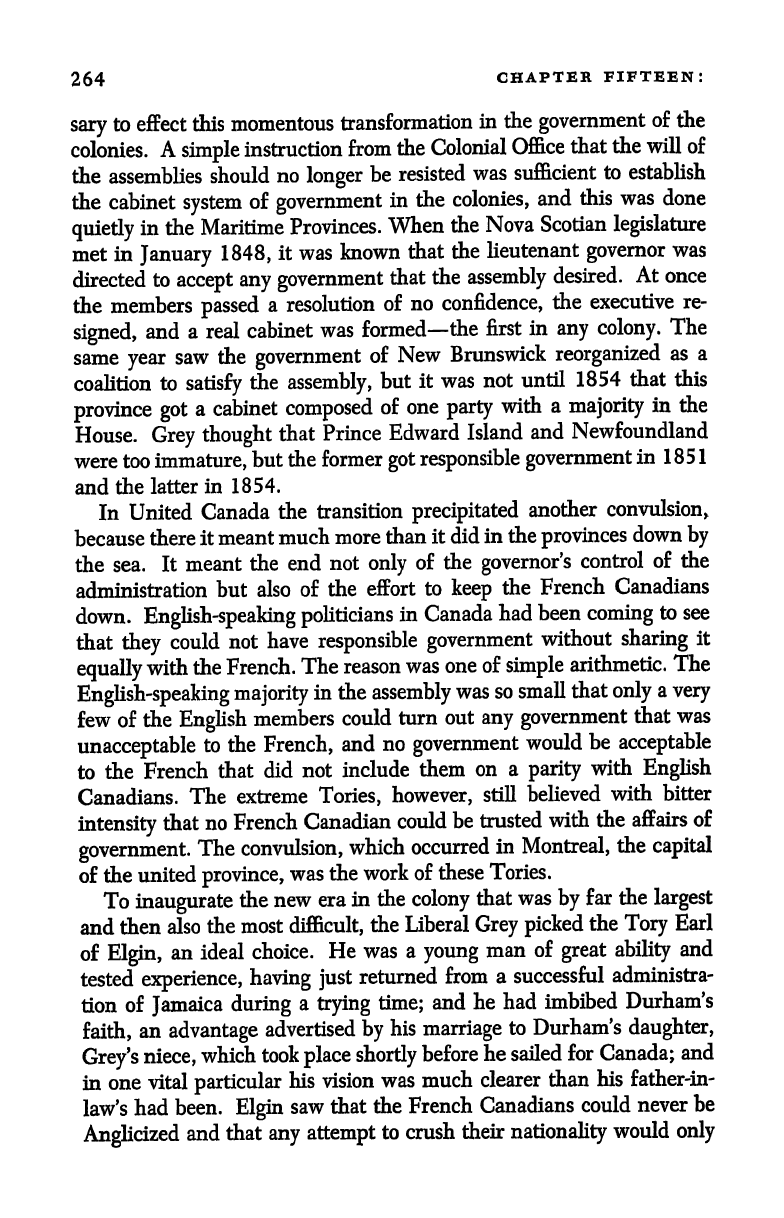
264
CHAPTER
FIFTEEN:
sary
to
effect this
momentous
transformation
in
the
government
of
the
colonies.
A
simple
instruction
from
the Colonial
Office
that the will
of
the assemblies
should
no
longer
be
resisted
was
sufficient
to establish
the cabinet
system
of
government
in
the
colonies,
and
this was done
quietly
in the
Maritime
Provinces.
When
the
Nova
Scotian
legislature
met
in
January
1848,
it
was
known
that the
lieutenant
governor
was
directed
to
accept
any government
that
the
assembly
desired.
At
once
the members
passed
a
resolution
of
no
confidence,
the
executive re-
signed,
and
a
real
cabinet
was formed
the
first
in
any
colony.
The
same
year
saw
the
government
of
New
Brunswick
reorganized
as
a
coalition
to
satisfy
the
assembly,
but
it was
not until
1854
that this
province
got
a cabinet
composed
of one
party
with
a
majority
in the
House.
Grey
thought
that
Prince
Edward Island
and
Newfoundland
were
too
immature,
but
the
former
got
responsible
government
in 1851
and
the
latter
in 1854.
In
United
Canada
the
transition
precipitated
another
convulsion,
because
there
it
meant
much
more
than
it did
in
the
provinces
down
by
the sea.
It
meant
the
end
not
only
of
the
governor's
control
of the
administration
but
also
of
the
effort
to
keep
the
French
Canadians
down.
English-speaking
politicians
in
Canada
had
been
coming
to see
that
they
could
not
have
responsible
government
without
sharing
it
equally
with
the French.
The
reason
was
one
of
simple
arithmetic.
The
English-speaking
majority
in the
assembly
was so
small
that
only
a
very
few
of
the
English
members
could
turn
out
any
government
that
was
unacceptable
to
the
French,
and
no
government
would
be
acceptable
to
the French
that
did
not
include
them
on
a
parity
with
English
Canadians.
The
extreme
Tories,
however,
still
believed
with bitter
intensity
that
no
French
Canadian
could
be
trusted
with the
affairs of
government.
The
convulsion,
which
occurred
in
Montreal,
the
capital
of
the
united
province,
was
the work
of
these
Tories.
To
inaugurate
the new
era
in
the
colony
that
was
by
far
the
largest
and
then
also
the most
difficult,
the
Liberal
Grey picked
the
Tory
Earl
of
Elgin,
an
ideal
choice.
He was a
young
man
of
great
ability
and
tested
experience,
having
just
returned
from
a
successful
administra-
tion
of
Jamaica during
a
trying
time;
and
he
had
imbibed
Durham's
faith,
an
advantage
advertised
by
his
marriage
to
Durham's
daughter,
Grey's
niece,
which
took
place
shortly
before
he sailed
for
Canada;
and
in
one
vital
particular
his
vision
was much
clearer
than
his
father-in-
law's
had
been.
Elgin
saw
that
the
French
Canadians
could
never
be
Anglicized
and
that
any attempt
to
crush their
nationality
would
only
